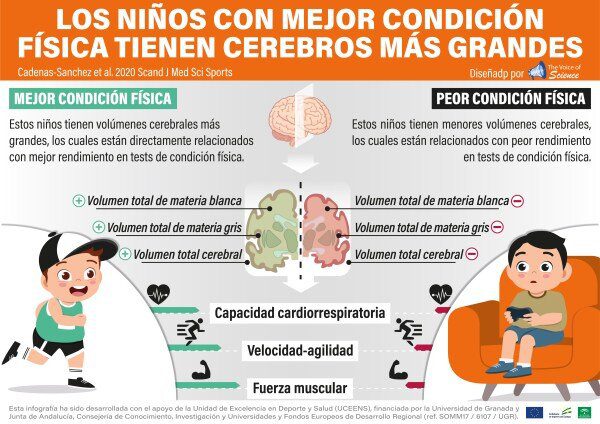Many studies have already pointed out that to grow up healthy, In particular, children need to spend less time sitting in front of a screen, in a seat or in their stroller, get good quality sleep and devote more time to active play. New research shows a link between physical activity and healthy brain development, and highlights how essential brain development is for their well-being. Published in the journal, “Scandinavian Journal of Medicine & Science in Sports”, it indicates that children with a level of fitness higher have larger brains, and exhibit better endurance capacity, speed, and strength.
Researchers from the University of Granada who are leading the “ActiveBrains” project, in which more than 100 overweight or obese children have participated to date, explain that children classified as “in good physical shape” had more gray matter and white matter in their brains, which would otherwise be larger, compared to children considered to be in poor physical shape. Because it turns out that the amount of gray and white matter in the brain not only has a beneficial impact on cognitive performance, in particular greater cognitive flexibility and greater executive function, but also on physical capacities.
“The importance of good physical shape at an early age”
“Our research shows the importance of being in good physical shape at an early age for better brain development at a stage as critical as childhood. “, Say the researchers in a press release. “Previous studies had shown that during the aging process the brain shrinks, and exercise and fitness can help reduce this physiological process. But their own research is the first to confirm for the first time that in childhood, when the brain grows and develops, maintaining a good level of physical fitness is linked to better overall brain development.
These results are important for two reasons, the first being that the evaluation of the children’s physical condition at school allows them to provide information on their level of physical health, as previous studies have already shown, but also and consequently on their brain health. What’s more, these findings pave the way for further research on how increasing children’s fitness levels through exercise programs can promote brain development and cognition. Note that according to the WHO, children and adolescents aged 5 to 17 should devote 60 minutes per day to moderate to sustained physical activity.










